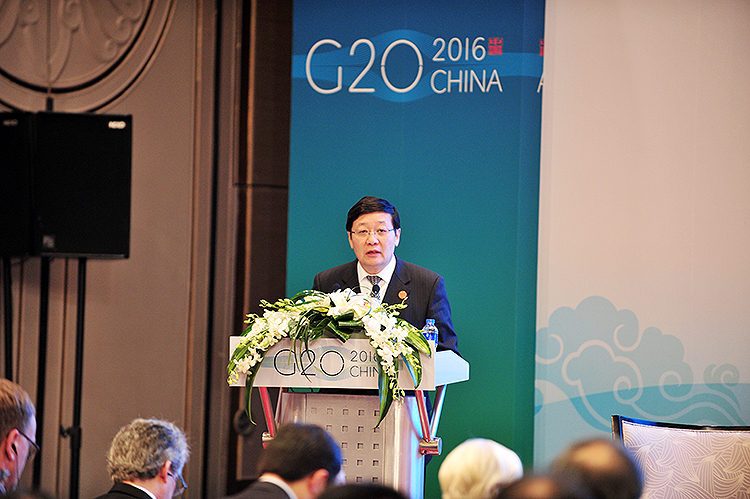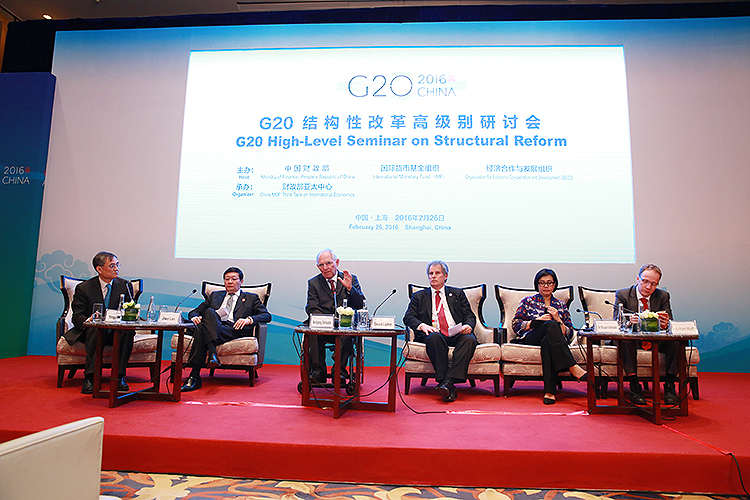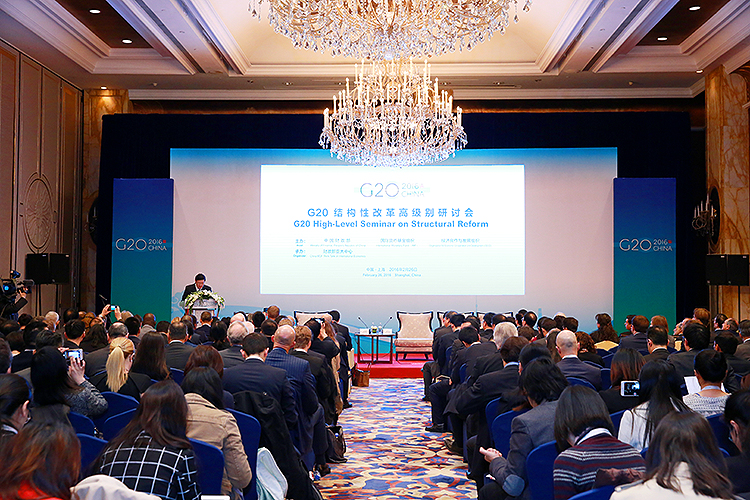G20结构性改革高级别研讨会在上海举行(附英文版)
发布日期:2016年02月26日
2016年2月26日 来源:财政部新闻办公室
2016年2月26日,G20结构性改革高级别研讨会在上海举行。本次会议由中国财政部与国际货币基金组织(IMF)、经济合作与发展组织(OECD)联合主办,财政部亚太中心承办。财政部部长楼继伟、IMF总裁拉加德、OECD秘书长古里亚、上海市市长杨雄出席开幕式并致辞。来自二十国集团(G20)成员国、嘉宾国和相关国际组织的代表,以及来自国内外高校和研究机构的知名专家共200余人参加了会议。
结构性改革是今年G20财金渠道的重要议题之一。本次研讨会在G20财长和央行行长会议前举行,旨在促进G20各方加强交流,凝聚共识,为推动G20成员深化结构性改革提供推动力。研讨会聚焦世界经济面临的主要结构性挑战,以及改革的重点领域和优先方向。各方就如何推进结构性改革、如何衡量改革的进展和成效等问题发表了看法。中国、德国、印度、墨西哥、西班牙等部分G20成员还分享了各自推进结构性改革的国别经验。
楼继伟部长表示,近年来G20对结构性改革的重视不断加大,并做了许多政策努力,但与实现“强劲、可持续、平衡增长”目标仍有一段距离,结构性改革议程仍需加强。为推进结构性改革,应从促进贸易与投资、劳动力市场改革、鼓励创新、提高财政可持续性等多方面着手,提高全要素生产率和经济增长水平。结构性改革要和宏观政策相结合,特别注重改革措施的顺序,并采取配套措施,以实现短期增长和长期可持续增长的平衡。
楼继伟部长指出,G20要加强改革行动的顶层设计,在考虑各国国情和发展阶段差异的基础上,G20可以就一些最基本的改革领域和原则寻找“最大公约数”,制定G20结构性改革的优先领域和一般原则。在深化顶层设计的同时,G20应制定一套量化、可衡量的指标体系,以对各方结构性改革进展与成效进行监测分析,更好地推进落实各项改革承诺。
拉加德指出,考虑到目前经济增长的脆弱性和全球经济下行风险,推动供给侧结构改革的同时也要注重需求侧改革,采取更广泛的政策措施促进经济增长,树立中长期信心。古里亚强调,结构性改革能够提高生产率、增加就业,但结构性改革的步伐自2011年以来有所放缓,须督促各国加快改革步伐,更好地评估结构性改革的进展。杨雄市长表示,当前上海经济仍然面临着不少结构性问题,特别是供给侧的结构性问题,为此,上海将着力加强供给侧结构性改革,把优化经济结构作为主攻方向,把深化改革开放作为根本途径,把推动科技创新作为核心举措。
(财政部亚太中心供稿)



G20 High-level Seminar on Structural Reform Held in Shanghai
(Press Release, 26 February 2016 )
The G20 High-level Seminar on Structural Reform was held on February 26, 2016 in Shanghai. The seminar was jointly sponsored by the Ministry of Finance of the People’s Republic of China, International Monetary Fund (IMF) and Organization for Economic Co-operation and Development (OECD), and was hosted by China MOF Think Tank on International Economics. Lou Jiwei, Finance Minister of China, Christine Lagarde, Managing Director of the IMF, Angel Gurria, Secretary-General of the OECD, and Yang Xiong, Mayor of Shanghai Municipal Government attended the opening ceremony and delivered speeches. A total of more than 200 people attended the seminar, including representatives of G20 member countries,relevant international organizations, and renowned experts from home and abroad.
Structural reform is one of the important topics of the G20 Finance Track this year. This seminar was held prior to the G20 Finance Ministers and Central Bank Governors Meeting for the purpose of promoting all parties of G20 to enhance the dialogues in a way to mobilize consensus, and provide new impetus to G20 members to deepen structural reform. The seminar focused on the main structural challenges faced by the global economy, and the key reform areas and priorities in G20 countries. All parties aired their views on how to advance structural reform, and how to assess the progress and performance of the reform. Some G20 member states, including China, Germany, India, Mexico and Spain shared their own experiences on structural reform.
Minister Lou Jiwei is of the view that G20 has been attaching increasing importance to structural reform and has made many endeavors in terms of policies. However, there still remains some distance from realizing the objective of “strong, sustainable and balanced growth.” The agenda for structural reform still needs to be strengthened. Efforts should be made from various aspects to advance structural reform, such as promoting trade and investment, conducting reform of labor market, encouraging innovation and improving the fiscal sustainability to improve total factor productivity and boost economic growth. Efforts should be made to combine structural reform with macro policies, special attention should be paid to the priorities and sequencing of reform with supporting measures, so as to strike a balance between short-term growth and long-term sustainable growth.
Minister Lou Jiwei points out that G20 should strengthen the top-level design of reform. While taking into consideration the differences in national conditions and development phases of various countries, G20 can seek “the greatest common factor” by identifying the key reform areas and priorities, and formulating the basic guiding principles for G20 structural reform. Based on this, G20 could set up a set of quantitative and measurable index system to supervise and analyze the progress and performance of structural reform in G20 countries so as to better honor the commitment of various reforms.
Christine Lagarde points out that considering the vulnerability of present economic growth and the downward risk of global economy, importance should be attached to demand-side reform while promoting the supply-side structural reform, and more extensive policies and measures should be adopted to boost economic growth and build mid-to-long-term confidence. Angel Gurria stresses that although structural reform can raise productivity and increase employment, it is imperative to urge all member countries to accelerate the pace of structural reform which has been slowed down since 2011 to better evaluate the progress of such reform. Mayor Yang Xiong indicates that Shanghai will step up its efforts to conduct supply-side structural reform since it is still faced with many structural problems, particularly those with the supply side. To this end, Shanghai will focus on economic structure optimization, with the deepening of reform and opening-up as the fundamental approach, and technical innovation as the core measure.
注:以中文版为准,英文版仅供参考。
(Contributed by China MOF Think Tank on International Economics,
财政部亚太中心供稿)
附件下载:
相关文章:






 京公网安备11010202000006号
京公网安备11010202000006号



